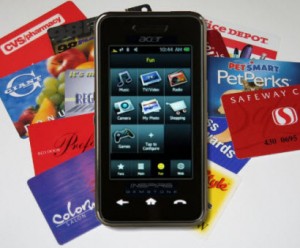Source : mogulmediasolutions?
Decades ago, retail was based on personal relationships.? As customers entered the store, each would be recognized and greeted personally by the merchant. This helped build friendship and respect between customer and merchant; making the merchant a trusted source of advice and information about products old and new.
Fast forward to today. The personalized approach is disappearing, and with it customers? loyalty to the merchant. ?Indeed, customers now are spoilt for choice, with a bewildering array of products and multitudes of competing merchants.
Anxious to rekindle that special bond with their customers, many merchants have developed loyalty programs. These come in many varieties including member discounts cards, points accumulation cards, and the familiar “Buy 10 get 1 Free” punch cards, all with the goal of creating, and rewarding, loyalty. Obviously everyone loves rewards, but if customers participated in the loyalty program of each and every merchant, there wouldn’t be enough space in any wallet to hold all those cards!
Now as smartphones enter the mass market, and become ubiquitous, a renaissance in customer loyalty programs is promised with programs going mobile and offering digital cards to replace the physical ones.? Already digital giants Facebook and Google have jumped into the mobile loyalty solutions space, with Apple?s PassBook waiting in the wings.
In July 2011, Google acquired Punchd, a digital loyalty card startup. Almost a year later, Facebook bought TagTile, a mobile-based customer loyalty management company.? While working differently, both offer smartphone apps that replace physical loyalty cards. ?Punchd, replaces punch cards with a digital version, customers scan QR codes each time they make qualifying purchases and earned a “punch” or “stamp” towards their rewards. That solution was so simple that it spawned dozens of imitators, including Singapore-based Perx (backed by Eduardo Saverin, a co-founder of Facebook).
Source : MobileMarketingStudio
But has reality lived up to the hype? It seems that, despite their apparent convenience, these solutions haven’t really taken off with merchants and today?s implementations still remain fragmented.?Real loyalty goes beyond free drinks and pushing promotions. When the merchant of yesteryear personally greeted their customers, they didn?t press money into their hands! They enquired about their health, their family, and their shopping needs. In other words, they really knew their customers.
Smart merchants realize the key to building customer loyalty is collecting, and applying, customer information: learning about customers, so as to serve them better. General demographics, location and social data are simply not enough: anyone can grab that data. Merchants need to learn who their customers are (name, age, birthday, contact details, etc.), and most vitally understand their buying habits (which brands of coffee do they buy? how many times a month do they buy coffee? how much are their coffee purchases worth in a year? etc.).
As Bryan Pearson, author of The Loyalty Leap, puts it: a loyalty program needs to be relevant to its members in order to thrive. ?He stresses that the entire loyalty program experience, from sign-up thru all customer communications, to the rewards delivered, must be intensely relevant to the customer?s wants and values. Capturing, and owning, customer information is therefore the foundation of every successful loyalty program.
Knowing how quickly a customer collected his 10 stamps and got a free drink is scarcely the start of loyalty. With inaccurate or missing data, the customers that merchants think of as their best ones, may not really be loyal but looks good because they bought frequently.? Effective, relevant, loyalty programs entail knowing the customer?s name, his spending amount, what else he bought with his coffee (and rewarding him for this), even understanding what promotions most impact his spending. Today?s solutions are solely lacking in this regard.
Merchants must be to be at the center of the mobile loyalty transaction process and not the solution provider. Customer information is vital to future loyalty and business success and that?s a true core asset which must be a well-guarded company secret.?Merchants need to be able to track purchases, and tie them to specific customers. This is the only way to develop and maintain a rich, accurate profile of each customer, and understand each customer?s lifetime value. The customer profile will be vital in delivering targeted messages and offers that really matter to that individual. And knowing the lifetime value will allow merchants to focus on their most profitable customers.
Loyalty is not gained through a single offer. What happens after the customer collects all 10 ?stamps? and gets the free drink? Does it all start over from the beginning with a blank card? Or should the customer be elevated to the next level? Did we learn nothing from these transactions?
One free cup of coffee is unlikely to create a loyal customer.? Any more than one handshake did in years gone by. Loyalty is the result of painstaking, continuous, relationship building.
Mobile loyalty programs offer great technological promise. The mobile is an ideal tool for customer acquisition, redemption and the data collection necessary for targeting high-value customers.? It?s important to watch this space. It?s very dynamic and will be extremely lucrative for merchants that master mobile loyalty correctly. Bear in mind though, that merchants cannot work with every solution available and customers cannot be expected to have an app for every loyalty program out there. The mobile will get as crammed as the wallet!?
Editorial note:? This article is a special one that we mention as Guest Post from Adrian Stewart, who has been associating in Digital IT business for many years, send this article to thumbsup editors to upload particularly for thumbsup readers.? Contents written by Adrian do not reflect our thumbsup editors? idea at all, it is his personal view.
This article is supposed to be intellectual property of the author that thumbsup has been officially authorized for this publication.? In case of utilizing this article, kindly honor by referring to this author and linking back to the original text.? Thanks.





